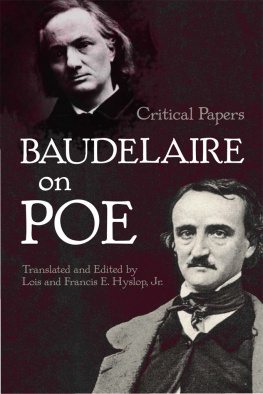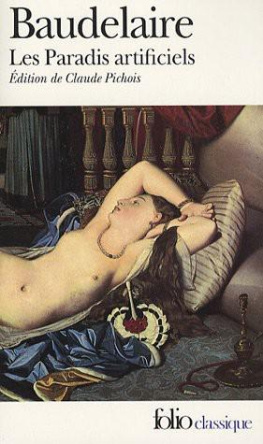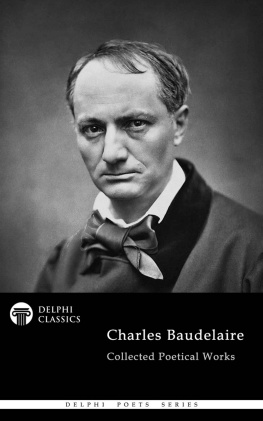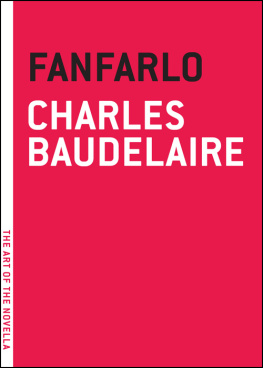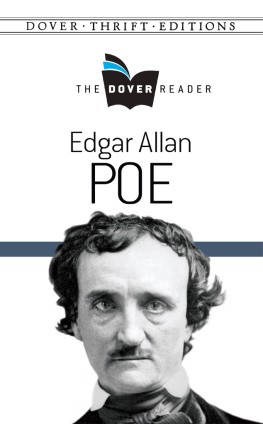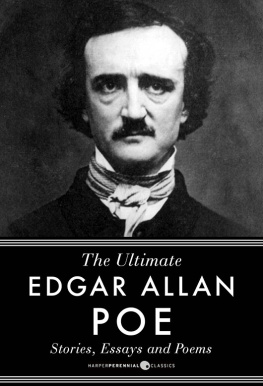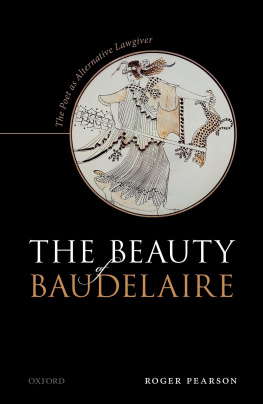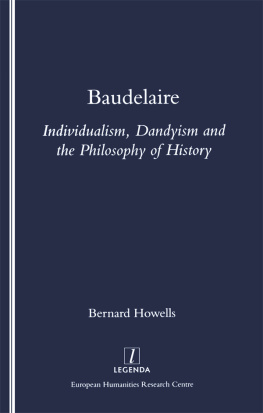Baudelaire on Poe
Critical Papers
Charles Baudelaire
Translated and Edited by
Lois and Francis E. Hyslop, Jr.
DOVER PUBLICATIONS, INC.
Mineola, New York
Bibliographical Note
Baudelaire on Poe: Critical Papers, first published by Dover Publications, Inc., in 2014, is an unabridged republication of the work published by Bald Eagle Press, State College, Pennsylvania, in 1952. The one-page excerpts from the original French essays on pages 35, 87, and 119, which end mid-sentence, are followed by blanks in the 1952 edition.
International Standard Book Number
eISBN-13: 978-0-486-78941-5
www.doverpublications.com
for
SISSEL KATHERINE BOE
MARY MACHATTON HYSLOP
ACKNOWLEDGEMENTS
We wish to thank the following persons who have assisted us in their several ways in the publication of this book: Professor Joseph J. Rubin, editor of the Bald Eagle Press, whose idea it was to bring this material together in one volume; Professor W. T. Bandy of the University of Wisconsin, an authority on Baudelaire, who was kind enough to read the introduction and to make valuable suggestions; Professor C. D. Zdanowicz; Professor L. Roudiez; Professor H. Steiner; Professor F. M. Du Mont; Professor W. L. Werner; Margaret K. Spangler and the library staff of The Pennsylvania State College. The Boston Museum of Fine Arts courteously supplied a photograph.
Among the books consulted, first and foremost stands M. Jacques Crpets magnificent publication, Oeuvres Compltes de Charles Baudelaire, Paris, Louis Conard, 1922-1948, fifteen volumes. Three more volumes are scheduled to appear. Other useful works were Lon Lemonniers two books, Les Traducteurs dEdgar Poe and Edgar Poe et la Critique Franaise, both published in Paris by the Presses Universitaires in 1928; Selected Critical Studies of Baudelaire (in French, except for the introduction), edited by D. Parme, Cambridge, Cambridge University Press, 1949; Connaisance de Baudelaire, by Henri Peyre, Paris, Corti, 1951; From, Baudelaire to Surrealism, by Marcel Raymond, New York, Wittenborn and Schultz, 1950; The Complete Works of Edgar Allan Poe, edited by James H. Harrison, New York, Crowell, 1902, seventeen volumes; The Complete Poems and Stories of Edgar Allan Poe, edited by Arthur Hobson Quinn and Edward H. ONeill, New York, Knopf, 1946, two volumes.
INTRODUCTION
I
Students of Baudelaire or Poe are well aware that the translations by the French poet have made the American writer a vital part of European literary experience. So distinguished and so well known are these translations that Rmy de Gourmont believed they alone would have assured Baudelaire a place in the history of French literature.
Baudelaires critical essays on Poe, although recognized in the Literary History of the United States as criticism of the finest quality, are comparatively unread in this country. Written to introduce his American contemporary to the French public, full of boundless enthusiasm and warm emotion, they reveal an acute critical perception of Poes literary qualities, and a fervent admiration and love for one whom Baudelaire believed to be his spiritual brother.
Baudelaire himself had hoped to publish his Poe essays in a limited edition, but his hope failed to materialize. His second essay, written in 1856, was translated as the introduction to a British edition of Poes works published in London in 1872 by Chatto and Windus. The translator, H. C. Curwen, was apparently the first person to make a small portion of Baudelaires criticism available in English. Curwens translation has long been out of print and suffers from a few omissions and errors. Since 1872 no other effort has been made to translate any of these three essays. This edition, suggested by the editor of the Bald Eagle Press, includes the three major essays as well as the other prefaces and notes in which Baudelaire attempted to interpret and explain Poe and his works. A study of the sources of these essays is soon to be published by Professor W. T. Bandy of the University of Wisconsin, an outstanding authority on Baudelaire.
Translations of individual stories by Poe began to appear in France almost immediately after the publication of the Wiley and Putnam edition of his work in 1845. The Gold Bug appeared that same year in the Revue Britannique, a magazine which drew most of its rather varied material from British and American sources. Baudelaires interest was first stimulated by several translations which Mme. Isabelle Meunier, an English girl and the wife of Victor Meunier, published in the socialist paper Dmocratie Pacifique. The Black Cat, published January 27, 1847, was the first in this series.
It is interesting to note that Victor Meunier, a disciple of the socialist philosopher Fourier, was instrumental in having his wifes translations published and that these very translations were influential in persuading Baudelaire to renounce his socialist ideas and to adopt an anti-democratic attitude.
Baudelaires correspondence with his mother and his friends makes clear how much he was impressed by the American writer to whom he was dedicated for the rest of his life. Much later, in 1860, replying to a letter of inquiry from the critic Armand Fraisse, he wrote:
I can tell you something even more strange and almost unbelievable. In 1846 or 1847 I happened to see some stories by Edgar Poe. I experienced a peculiar emotion. His complete works not having been collected in a single edition until after his death, I patiently set about making the acquaintance of Americans living in Paris, in order to borrow copies of the magazines which Edgar Poe had edited. And then, believe me if you will, I found poems and short stories which I had conceived, but vaguely and in a confused and disorderly way, and which Poe had been able to organize and finish perfectly. Such was the origin of my enthusiasm and of my perseverance.
Several things help to explain Baudelaires enthusiasm. Poe, as an American, writing in English, appealed to Baudelaires love of the exotic, a taste which Baudelaire shared with other French writers and artists of the nineteenth century, such as Delacroix, Ingres, Leconte de Lisle and Hrdia. Add to this Poes preoccupation with morbid subjects which found a natural response in a poet who deliberately cultivated sickly flowers. Further, Baudelaires sympathy was deeply aroused by the tragic difficulties of Poes life, which he associated with his own. In 1853 the French poet wrote to his mother: Now do you understand why, in the midst of the frightful solitude which surrounds me, I have understood Edgar Poes genius so well, and why I have written so well about his wretched life? Finally, an emphasis on artistic purity in Poes theoretical essays strengthened Baudelaires bias in the same direction. Had Poe lived longer, their affinity of temperament probably would have brought the two men into direct contact with each other.
In order to make his study and translations of Poe as accurate as possible, Baudelaire did everything in his power to improve his knowledge of English and to gather information pertinent to his subject. His mother, who was born in England and had lived there for several years, knew a little English, but her son apparently acquired most of his knowledge of the language through his own efforts. At school he had done much better in Latin than in English. To prepare himself more fully he collected a great variety of documents, including a file of the Southern Literary Messenger during the period of Poes editorship. He ordered the new editions of Poes works from New York and London and wrote to persons who had known Poe and who might give him personal details. An undated letter among Baudelaires papers, presumably from an American correspondent, reads as follows: Mr. Griswold is very ill and is not expected to live. Mr. Willis is not here. Therefore I have not been able to get the information about Poe which you requested.
Next page
